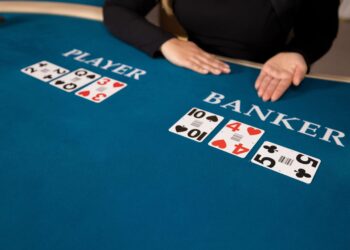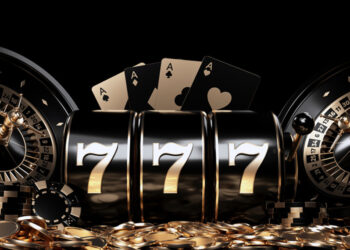 BD88 MY
BD88 MY
300% Welcome Bonus Up To RM1,500
Claim Bonus
 BK8 MY
BK8 MY
100% Welcome Bonus Up to RM300
Claim Bonus
 Dafabet MY
Dafabet MY160% Welcome Bonus Up to RM480
Claim Bonus
 Me88 MY
Me88 MY200% Welcome Bonus Across First 3 Deposit
Claim Bonus
 W88 MY
W88 MY100% Welcome Bonus Up to RM1088
Claim Bonus
 Maxim88 MY
Maxim88 MY100% Welcome Bonus Up to RM500
Claim Bonus
 Nova88 MY
Nova88 MY55% Welcome Bonus Up to RM550
Claim Bonus
 M88 MY
M88 MY188% Welcome Bonus Up to RM888
Claim Bonus
 GDwon333 MY
GDwon333 MY100% Welcome Bonus Up to RM300
Claim Bonus
 CMD368 MY
CMD368 MY150% Welcome Bonus Up to Rm900
Claim Bonus
Gamblers, particularly those who are considered “hardcore” gamers, are known for their unwavering dedication to the tables, regardless of whether they win or lose. But why do they persist, even when facing continuous losses? The answer lies in the exhilarating thrill that gambling provides, as addictive gamblers often find themselves irresistibly drawn back to the poker tables or slot machines, even in the face of financial ruin.
“I had only one thought on my mind: keep gambling on and on,” reminisced a former gambler to Scientific American in 2013. “I love to gamble—gambling gets me high.”
Recently, a Wall Street executive confessed to defrauding family, friends, and others out of $100 million due to his gambling addiction.
“There was only one thought: find a way to get money and satisfy my gambling addiction,” he admitted in court.
But does the euphoria of gambling outweigh the pain of losing, even when a gambler has lost everything, including their job and home, due to their addiction?
It is crucial to emphasize that people do not gamble solely to win money. Mark Griffiths, a psychologist specializing in behavioral addictions at Nottingham Trent University, states that gamblers are motivated by a variety of factors.
A survey of 5,500 gamblers revealed that the biggest motivation for gambling was “making a lot of money,” followed by “gambling is fun” and “gambling is emotionally stimulating.”
“When you gamble, your body continues to produce adrenaline and endorphins, even when you’re losing money,” explained Griffiths. “It’s essentially spending money to buy pleasure.”
This notion was supported by a 2009 study conducted by researchers at Stanford University. The study found that as many as 92% of individuals set a “loss threshold” for themselves, and if their losses did not exceed this limit, they would not leave the gambling table. However, the losses incurred at the online casino Malaysia did not necessarily dampen their enjoyment of the overall gambling experience.
“People are comfortable with small wins and comfortable with smaller losses,” stated co-author Sridhar Narayanan. “They are well aware that, in the long run, they are more likely to lose money than win.”
Paradoxically, losing money can trigger a pleasurable response when it comes to winning, at least in the short term. This is because sustained losses alter a gambler’s expectations of winning.
Neuroscientist Robb Rutledge and his colleagues at University College London conducted an experiment involving 26 subjects. The participants were asked to make a series of choices while their brains were scanned. These choices ranged from definite outcomes to indeterminate outcomes, similar to gambling. Additionally, after every two or three choices, the participants had to rate their current level of happiness. A similar experiment, involving a smartphone app called the Great Brain Experiment, was conducted on a staggering 18,000 subjects.
Through these experiments, the research team made intriguing discoveries. For instance, when the subjects’ expectations of winning were low, their response to receiving the same reward was heightened. This was evident both in the participants’ self-reported feelings of pleasure and in MRI scans, which showed increased activity in brain regions associated with dopamine neurons. Dopamine, a complex neurotransmitter, likely played a role in altering the emotional state of the subjects in this study.
“When people continuously get things wrong and lower their expectations as a result, the pleasure they experience upon finally getting something right increases significantly,” explained Rutledge.
This surge in pleasure can be immensely stimulating.
“When you experience a series of negative outcomes, lowering your expectations for positive outcomes, any subsequent positive outcome can elicit a great deal of happiness,” he elaborated. “At that point, it is probably wise to walk away immediately.”
Can gambling machines be intentionally manipulated? Griffiths once authored a paper examining the cues that video game consoles emit to influence player behavior. Although the precise mechanisms by which these machines impact player behavior remain poorly understood, many gaming machines and casinos employ warm, evocative colors such as red.
Furthermore, the enticing sound effects contribute to the allure. Griffiths pondered whether a generic video game console that taunted players in a parody of The Simpsons would evoke feelings of antagonism in players.
Every time the player lost, the character “Mr. Smither” would exclaim, “You’re fired!”
“According to the underlying assumptions of frustration theory and cognitive regret theory, this setup would enhance the appeal of video game consoles,” Griffiths wrote in his paper.
The frequency with which a player engages in bets is a key factor in determining the addictive nature of any form of gambling. The number of betting opportunities offered by gambling is linked to the range of challenges within a game that must be overcome. Griffiths asserts that the factor that most influences experienced gamblers is the potential rewards, rather than the actual rewards they ultimately receive or even the type of gambling involved.
Games and slot machines often offer players alternative rewards following a loss, such as extra points or increased rewards in the subsequent game.
“If you continuously provide players with small rewards, even if they are non-monetary, it gradually locks them in,” Griffiths remarked.
Interestingly, gamblers sometimes develop their own “pseudo-skills” in pursuit of these potential rewards. Griffiths cites a British gaming machine as an example. The machine has an adaptive function that periodically dispenses more chips than it takes in. Once this “generous” period concludes, the machine’s settings revert to normal. Consequently, some players attempt to locate machines with hidden undistributed jackpots, hoping to capitalize on the next “generous” interval.
All these facts underscore a crucial point: winning is not the sole motivation behind gambling, and the intentions of many gamblers in a casino extend beyond merely winning money. Gambling is a self-contained process—a collection of accompanying elements that evoke pleasurable sensations in the gambler.
While the root causes of gambling addiction remain elusive and there are myriad reasons why an individual may succumb to gambling addiction, it is imperative to delve into the reasons why games of all types and structures produce such morbid pleasures in players.
While gambling may not be an entirely negative allure, it continues to possess a deadly fascination for those whose pockets are already depleted. Will you bet on red or black next time? The answer may be ambiguous because, ultimately, you may no longer care about winning or losing.













Discussion about this post